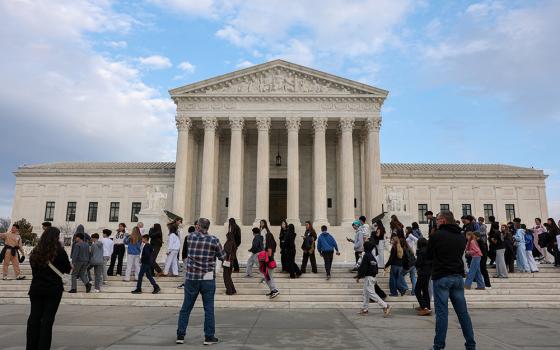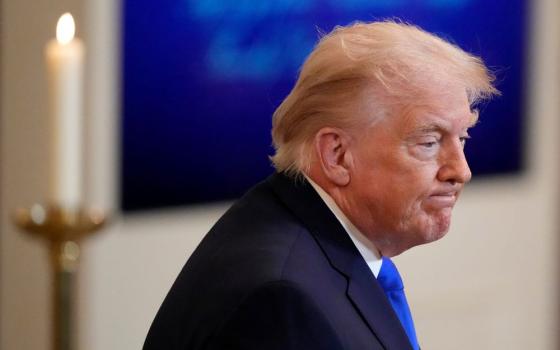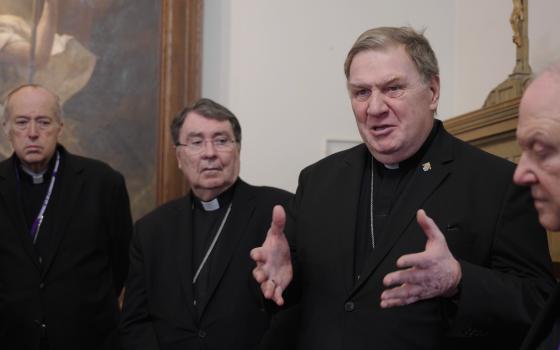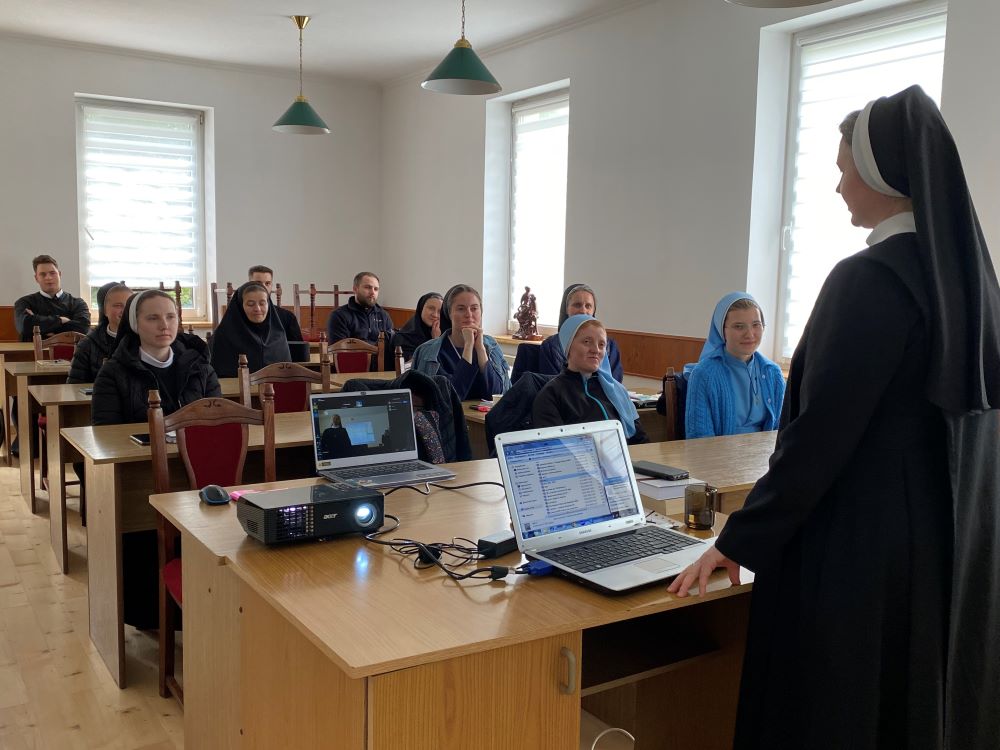
Novices attend a lecture at the novice school Effata in Lviv, Ukraine. (Courtesy of Scholastica Oleksandra Hulivata)
The number of members of monastic communities is a dynamic phenomenon: Some come for formation, some leave after a few years, and still others — having lived through much and celebrated anniversaries of their monastic vows — pass on to eternity. Statistical data reflect social, economic or cultural processes that influence the number of those who consecrate their lives to God. Yet, in the matter of religious calling, both as a general phenomenon and in each case in particular, there remains a certain mystery and sacrament. After all, the decisive factors are the will of the One who calls — God — and the will of the one who responds — a particular human person.
It would seem that the circumstances that exist in Ukraine today are the least favorable for choosing consecrated life. However, the facts speak to the contrary. God's love meets with a response full of dedication and sacrifice. Where does such dedication come from in times of war, amidst darkness, fear and hatred? Some believe that "difficult conditions and times awaken sacrificial hearts." There is, indeed, some truth in this.
One of the most successful projects of the Commission for Monastic Affairs of the Ukrainian Greek Catholic Church is the novice school Effata. Launched in 2003, the project gained even greater relevance at the beginning of the full-scale Russian invasion of Ukraine, in view of the crises and challenges in society.
Effata offers formation courses for novices in male and female monastic communities. The two-year training program covers the basics of liturgy, theology, spirituality and psychology. The novices also develop communication skills and build strong channels for cooperation within the church community between representatives of different monastic traditions.
I believe that young consecrated people can be the answer for those who have suffered the most from the war in Ukraine, who have lost all hope for peace and justice.
In the 2024-2025 academic year, 25 young men and women chose the path of consecrated life and began initial formation in their congregations studying under this program. The integration aspect of this program deserves special attention. Meeting every week, young consecrated people have the opportunity to share what they are experiencing in real time, jointly seek answers to the challenges posed by the modern world, and receive support from like-minded people.
In addition to subjects that build a theoretical foundation for the further development of consecrated life, the program includes practical training sessions. These sessions help them to see and respond to specific signs of the times. For two years, specialists from various fields of pastoral care and social work share their knowledge and work skills with the most vulnerable and most numerous groups of Ukrainian society. Of particular note is the work with veterans, military personnel and their families, and those who are experiencing loss or are in constant anxiety due to the captivity or disappearance of relatives.
Of course, the war has affected everyone without exception and has had devastating consequences for representatives of all categories of society, especially the most vulnerable. Therefore, many church institutions and monastic communities are actively engaged in volunteering in front-line zones, as well as in giving material, psychological and spiritual support for displaced people, those who lost their homes or work capacity as a result of the war. Our monasteries also help orphaned children, single mothers, abandoned elderly or seriously ill people. Such work requires not only a sincere, devoted desire, but also versatile training. It is precisely such training that the novice school Effata provides.
Why do young people choose the consecrated life today? Undoubtedly, in our era of noise and hurry, it is quite difficult to hear the gentle voice of God, but it is still possible. I believe that young men and women today choose a life of purity, poverty and obedience in order to respond with their very limited and variable, but extremely important, love to the unlimited and infinite love of the Lord. This love reveals itself to them and makes itself known to them in a very special intimate way. That is why no story of consecrated life, as in the past, is like another. Although the same Lord calls us, he calls each of us differently, in a unique way!
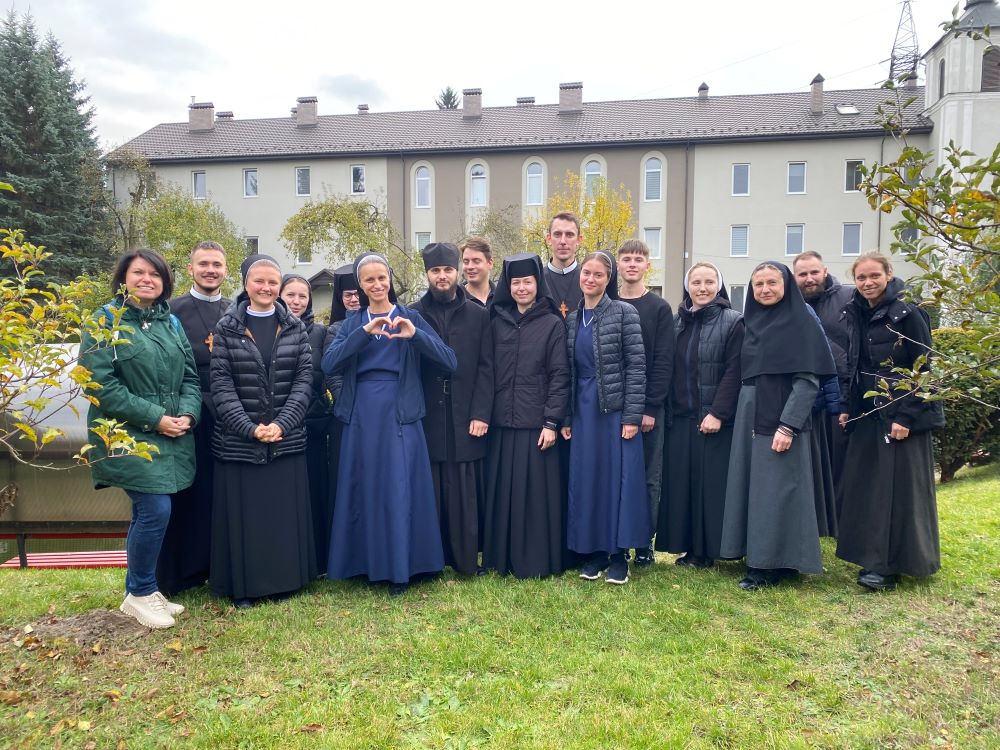
Novices participate in an Effata event. The program for young consecrated men and women grew in relevance at the beginning of the full-scale Russian invasion of Ukraine. (Courtesy of Scholastica Oleksandra Hulivata)
Why do young people in Ukraine choose a consecrated life today? To the personal explanation above, certain individual features of Ukrainian society in recent years should be added.
Modern youth grew up during the struggle for statehood and independence of Ukraine. This struggle set quite high moral demands — to live and die for the sake of others, as well as for the values that they profess. There is no doubt that the choice of consecrated life for Ukrainians is associated with serving not abstract humanity, but specific fellow citizens. It also means joining the common goal — to build a free, honest and just future for Ukraine.
Advertisement
The next reason is eschatological. Each of us is very close to death, both other people's and our own. Death is a daily prospect not only for the military, but also for civilians, whom Russia kills daily with ballistic missiles, artillery shelling and strike drones. From the perspective of eternity, many things become less important. Modern youth are able to rethink the meaning of their short stay on earth in order to direct their efforts to the eternal, to what is truly essential and indestructible. It is in this way that many of them come to know God, build relationships with him and, ultimately, to sacrifice their own lives for the sake of the Kingdom of Heaven.
The war in Ukraine has been going on for four years, and many changes have occurred during this time, but the question is constantly being asked: "Where is God?" I believe that young consecrated people can be the answer for those who have suffered the most from the war in Ukraine, who have lost all hope for peace and justice. Looking at the faces that shine with God's presence, I can believe that God is close. He is with those who need his presence the most. Jesus is with those who suffer. He is at the very heart of their suffering. He is able to turn sorrow into joy, war into peace, and death into life. Therefore, only in God is our hope!





